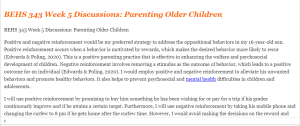BEHS 343 Week 5 Discussions: Parenting Older Children
Sample Answer for BEHS 343 Week 5 Discussions: Parenting Older Children Included After Question
BEHS 343 Week 5 Discussions: Parenting Older Children
You are a working single parent of a 16-year-old son and a 13-year-old daughter. Your son has an 11 PM curfew on weekends, but recently, he has been ignoring curfew and coming home after midnight. When you try to address this with him, he either ignores you or gets angry and starts screaming at you. When he’s at home, he tends to shut himself away in his room. His latest report card shows that his grades are slipping. You are getting very concerned, but you work full-time and parent by yourself, so you are getting frustrated as well.
At the same time, your daughter has been telling you that she doesn’t feel well and doesn’t want to go to school. After some prodding, she shared that she has been getting teased at school and bullied online.
After reviewing the learning resources for this week, come up with a strategy for dealing with your children that is supported by the literature on adolescent discipline. What are some of the things that you need to take into consideration? What actions would you implement to try and address the problematic behaviors you are witnessing? What actions would you avoid?
For this discussion, an excellent response will be well written and at least 2-3 paragraphs in length, incorporating at least 3 of the learning resources provided. You may also include other resources that you find outside of the classroom. Remember to use in-text citations and a reference list to identify the ideas that you learned from your sources. Any idea that came from something you read must be cited. When in doubt, cite it!
A Sample Answer For the Assignment: BEHS 343 Week 5 Discussions: Parenting Older Children
Title: BEHS 343 Week 5 Discussions: Parenting Older Children
BEHS 343 Week 5 Discussions Parenting Older Children
Positive and negative reinforcement would be my preferred strategy to address the oppositional behaviors in my 16-year-old son. Positive reinforcement occurs when a behavior is motivated by rewards, which makes the desired behavior more likely to recur (Edwards & Poling, 2020). This is a positive parenting practice that is effective in enhancing the welfare and psychosocial development of children. Negative reinforcement involves removing a stimulus as the outcome of behavior, which leads to a positive outcome for an individual (Edwards & Poling, 2020). I would employ positive and negative reinforcement to alleviate his unwanted behaviors and promote healthy behaviors. It also helps to prevent psychosocial and mental health difficulties in children and adolescents.
I will use positive reinforcement by promising to buy him something he has been wishing for or pay for a trip if his grades

continuously improve and if he attains a certain target. Furthermore, I will use negative reinforcement by taking his mobile phone and changing the curfew to 8 pm if he gets home after the curfew time. However, I would avoid making the decisions on the reward and punishment without informing him and would communicate them prior to avoid further resistance (Rincón et al., 2018).
Regarding my daughter, it will be important first to recognize that bullying is a problem for this girl. The child may be in psychological distress, and bullying puts her at risk of anxiety and depressive disorder. Interventions for my daughter will include applying empathetic listening to the girl and understanding her view about being teased at school and cyberbullying. I would also involve her teachers so that they can discourage teasing and bullying (Armitage, 2021). However, I would avoid blaming the girl for exposing herself to bullying since it would worsen her emotional well-being and worsen her school-refusal behavior.
BEHS 343 Week 5 Discussions: Parenting Older Children References
Armitage, R. (2021). Bullying in children: impact on child health. BMJ paediatrics open, 5(1), e000939. https://doi.org/10.1136/bmjpo-2020-000939
Edwards, T. L., & Poling, A. (2020). Motivating Operations and Negative Reinforcement. Perspectives on behavior science, 43(4), 761–778. https://doi.org/10.1007/s40614-020-00266-8
Rincón, P., Cova, F., Saldivia, S., Bustos, C., Grandón, P., Inostroza, C., Streiner, D., Bühring, V., & King, M. (2018). Effectiveness of a Positive Parental Practices Training Program for Chilean Preschoolers’ Families: A Randomized Controlled Trial. Frontiers in psychology, 9, 1751. https://doi.org/10.3389/fpsyg.2018.01751

